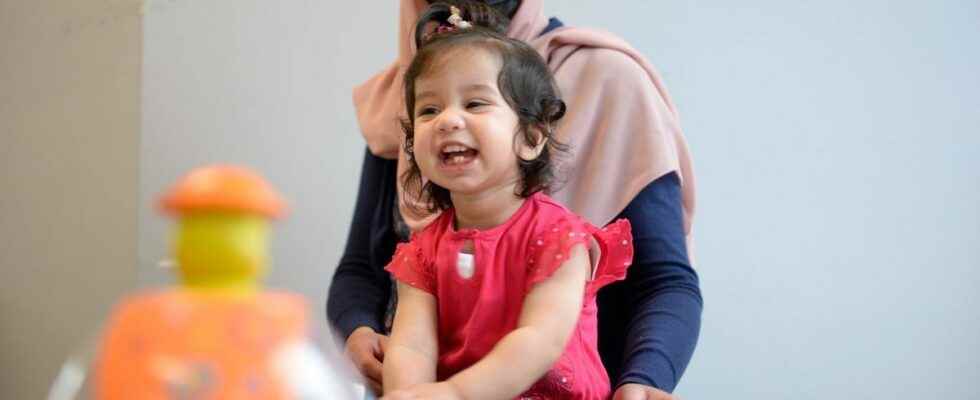Published on
Updated
Reading 2 mins.
For the first time in the world, doctors have successfully treated a fetus with Pompe disease – an often fatal genetic condition. Now 16 months old, little Alya is doing well.
Pompe disease is a rare disease of genetic origin that causes muscular, respiratory and cardiac symptoms that vary depending on the stage of onset. In the fetus, it damages major organs and is often fatal. However, for the first time, a baby suffering from this rare disease has been treated in utero. Now 16 months old, the child is in good health.
Pompe disease linked to a deficiency in a key enzyme
Pompe disease is a rare hereditary genetic disease, which mainly affects the muscles, causing progressive muscle weakness (myopathy), breathing difficulties. In infants with the severe form, the heart muscle (myocardium) is also affected, leading to severe heart problems.
It is due to the mutation of the GAA gene which will lead to the absence or abnormal functioning of an important enzyme (acid alphaglucosidase) which transforms glycogen into glucose, an important step for various cell functions, in particular muscle cells. and liver. Result: the glycogen is no longer transformed and it accumulates in the lysosomes (small vesicle within each cell). Pompe disease is thus called “lysosomal storage disease”. This overload eventually becomes toxic for the cells.
Six treatments were administered during the development of the fetus
To treat little Alya – whose siblings had already died of Pompe disease – doctors at the Ottawa Hospital used a new protocol developed at UC San Francisco: enzyme replacement therapy.
To replace the missing enzymes, the child received six in utero treatments: enzyme replacement infusions through the umbilical cord, as explained in the video below.
Results ? The baby was born full term and healthy. Her heart and motor functions were normal, unlike babies who are only treated at birth and usually have an enlarged heart.
Alya, miracle baby, is doing well
Since then, Alya has been doing well and receiving postnatal enzyme therapy. She is now 16 months old.
“When we had Ayla, we didn’t know if she would be able to walk, talk, eat, laugh. So as she hits each of these milestones, we continue to be amazed at her progress. So, yes, we are fully aware that she is a miracle“said Zahid Bashir, Ayla’s father.
The treatment is the result of a collaboration between UCSF, where a clinical trial of the treatment is underway, CHEO and The Ottawa Hospital, where the baby was diagnosed and treated, and Duke University, home to the world’s leading experts on Pompe disease.
“This treatment is very promising and I am very happy for Ayla and her family.“, commented Dr. Chakraborty, researcher at the CHEO Research Institute and associate professor at the University of Ottawa, before adding “Seeing how Ayla is doing, it is important to continue clinical trials to determine if this kind of fetal treatment will be a good option for other families…“.
